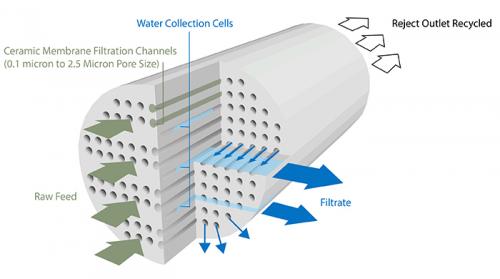Top 5 Reasons to Choose Ceramic Membranes for Water Treatment

Among the numerous options available, ceramic membranes have emerged as a leading choice for water treatment, offering several advantages over traditional polymeric membranes.
1. Unmatched Durability and Longevity
Ceramic membranes are known for their exceptional durability
and longevity, making them a cost-effective solution for long-term water
treatment. Unlike polymeric membranes, which can degrade over time due to
exposure to harsh chemicals, high temperatures, or abrasive particles, ceramic
membranes maintain their structural integrity even in the most challenging
conditions. Made from robust materials like alumina, zirconia oxides, titania,
and silicon carbide, ceramic membranes can withstand aggressive media without wear and tear.
This durability translates into a longer service life,
reducing the frequency of membrane replacements and minimizing downtime in
water treatment processes. Over time, this can result in significant cost
savings, making ceramic membranes a smart investment for industries that
prioritize long-term efficiency.
2. Superior Chemical and Thermal Stability
One of the key advantages of ceramic membranes is their
ability to maintain performance in extreme conditions. These membranes exhibit
superior chemical stability, allowing them to operate effectively in
environments with high acidity or alkalinity. This is particularly important in
industries such as chemical processing, where the filtration of corrosive
substances is a common requirement.
In addition to chemical stability, ceramic membranes also
offer excellent thermal stability. They can operate at high temperatures
without compromising their filtration efficiency, making them ideal for
processes that involve hot liquids. This combination of chemical and thermal
stability ensures that ceramic membranes deliver consistent performance, even
in demanding applications.
3. High Filtration Efficiency
When it comes to filtration efficiency, ceramic membranes
are hard to beat. Their fine pore structure allows for the effective separation
of particles, bacteria, and other contaminants from water, resulting in a
higher-quality filtrate. Whether you're dealing with suspended solids,
microorganisms, or dissolved impurities, ceramic membranes provide a reliable
barrier that ensures clean and safe water.
Moreover, ceramic membranes are less prone to fouling
compared to their polymeric counterparts. Fouling, which occurs when
contaminants build up on the membrane surface, can significantly reduce
filtration efficiency and increase maintenance costs. The resistance of ceramic
membranes to fouling means that they require less frequent cleaning, leading to
improved operational efficiency and reduced operational costs.
4. Versatility in Applications
Ceramic membranes are versatile and can be used in a wide
range of water treatment applications. They are suitable for everything from
microfiltration to ultrafiltration, making them adaptable to various industrial
needs. Whether you're treating drinking water, processing wastewater, or
filtering liquids in the food and beverage industry, ceramic membranes can be
tailored to meet specific filtration requirements.
Their versatility extends to their compatibility with
different types of filtration systems, including cross-flow filtration and
dead-end filtration. This flexibility allows industries to integrate ceramic
membranes into their existing processes with ease, enhancing overall system
performance.
5. Environmentally Friendly and Sustainable
In today's world, sustainability is a crucial consideration
for any industrial process. Ceramic membranes offer an environmentally friendly
solution for wastewater treatment, contributing to reduced waste and energy
consumption. Their long lifespan and resistance to fouling mean fewer membrane
replacements, leading to less material waste.
Additionally, ceramic membranes can be cleaned and
regenerated using less aggressive chemicals, reducing the environmental impact
of maintenance procedures. The high efficiency of ceramic membranes also means
that less energy is required to achieve the desired level of filtration,
further minimizing the carbon footprint of water treatment processes.
By investing in IPNR Endura's ceramic membrane technology, industries can achieve better filtration results, reduce operational costs, and contribute to a more sustainable future. If you're considering upgrading your water treatment system, ceramic membranes should be at the top of your list.
Comments